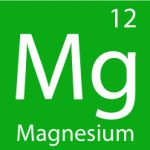The majority of the population is not getting enough magnesium in their diet to maintain the body’s ultimate function.
Magnesium is responsible for thousands of jobs within the body and it is not produced within at all so it is up to consumers to eat a diet high in magnesium rich foods and to supplement this intake where necessary. Have a look at this magnesium rich food list and see if your daily diet includes the required 320mg of magnesium for women and 420mg for men.
If it does then you are among the lucky 25% of people who are getting enough magnesium from their diet alone.
Modern farming practices have reduced the amount of magnesium that is transferred to our fresh produce from the soil by up to 25% so it is not as easy as it used to be to gain the levels required without considering dietary supplements.
Sufficient amounts of magnesium are required for:
- Maintaining a healthy cardiovascular system by relaxing and widening blood vessels and decreasing blood pressure;
sustaining a regular heart beat; ensuring even relaxation of the heart muscle cells occurs post contraction reducing spasming and cramping which causes cell damage (heart attack); preventing calcium deposits in the arteries. - Strengthening the skeletal system by supporting the formation of osteoblasts and osteoclasts which are the building blocks for new bone. This reduces the crippling effects of osteoporosis.
- Supporting the smooth function of muscles and nerves by opening the communication pathways.
- Balancing the amount of calcium in the blood and preventing the occurrence of calcium deposits i.e. gallstones and kidney stones.
- Assisting with the formation of ATP which is the molecule needed for energy thereby decreasing tiredness and fatigue. Learn more about the relationship between magnesium and energy here.
- Acting as a co-factor for thousands of enzymatic functions which break down the foods we eat into useable molecules of energy, nutrients, water and waste.
- Reducing levels of cortisol – a stress hormone and increasing serotonin levels to decrease anxiety and depression.
- Supporting and stabilising DNA inside the cells to encourage cell synthesis and turnover.
- Balancing the electrolytes- calcium, sodium, potassium and magnesium by facilitating their movement between intracellular and extracellular fluids.
- Drawing extra fluid into the bowel as required for the reduction of constipation.
- Relaxing tight muscles and decreasing stress.
When the body is in turmoil such as during times of extra physical or mental stress, chronic kidney or liver disease, pregnancy, administration of medications such as cardiac drugs, oral contraceptives and calcium supplements, or if your diet is high in carbonated beverages, caffeine and alcohol, you may require extra magnesium to keep up with the unusual increased depletion of stored magnesium that is occurring.
What is Magnesium Gluconate?
Magnesium supplements come in a variety of shapes and sizes. Magnesium gluconate is one of these manifestations of the popular mineral. It is a combination of magnesium with gluconic acid and is known as the most bioavailable of all the forms of magnesium salts that are commercially available for personal use. (wikipedia)
For an overview of some of the most popular versions, please click on the link below:
Some of the most commonly used forms of magnesium supplements are:
-
Magnesium Chloride
-
Magnesium Oil
-
Magnesium Citrate
-
Magnesium Sulfate (Epsom Salts
)
-
Magnesium Gluconate
Click on the link for more detailed information on each type.
What is Magnesium Gluconate Commonly Used For?
 Magnesium gluconate is regularly found along side magnesium sulfate as the drug of choice in emergency medicine for rapid intravenous administration for its superior bioavailability. Being bioavailable means it is absorbed and used by the body quickly and effectively with little or no wastage.
Magnesium gluconate is regularly found along side magnesium sulfate as the drug of choice in emergency medicine for rapid intravenous administration for its superior bioavailability. Being bioavailable means it is absorbed and used by the body quickly and effectively with little or no wastage.
Magnesium gluconate is also used as the active ingredient in liposomal magnesium which is one of the most potent forms of magnesium supplements available on the market today.
The advances in technology have lead to the development of a class of health supplements that have their molecules encased in liposomes which are then transported directly into the bloodstream by phospholipids without wasting a drop via metabolisation.
This ensures a higher dose of magnesium is reaching the system so not only does magnesium gluconate have superior absorption than its counterparts in the first place, when it is administered in a liposomal supplement, you are getting an ultimate dose of the all important mineral magnesium.
Liposomal supplements may have side effects of drowsiness, headaches, dilated pupils and and increased reaction to other sorts of medications so it is advised if you are pregnant or breastfeeding, have chronic disease, are taking medications or have allergies that you consult with your physician before commencing liposomal magnesium therapy, or indeed any other form of magnesium supplements.
 What is Magnesium Gluconate Recommended For?
What is Magnesium Gluconate Recommended For?
Magnesium gluconate is recommended for you. Magnesium gluconate has the best bioavailability of all the commercially available forms of magnesium supplement, especially when taken as a liposomal form so is a great choice when magnesium supplementation is necessary.
The best choice for your liposomal magnesium supplement is Optimal Liposomal Magnesium which contains no allergens, no GMO, and no soy. Click on the picture to be taken to Amazon for further information or purchasing.
Also check out other forms of magnesium to compare:
- What is Magnesium Chloride?
- What is Magnesium Citrate?
- What is Magnesium Gluconate?
- What is Magnesium Stearate? (a common additive found in magnesium supplements)




Permalink //
This was an interesting and informative tutorial on magnesium gluconate…I was not aware of this requirement we have at all for our health…
Certainly I learned a lot about why we need it and what a deficiency in our intake of magnesium gluconate will result in as far as adverse manifestations in our body…
Having said that , I am not a fan of taking massive amounts of supplements (or any really) and prefer to get the nutrition my body needs through the foods I consume.
That is why I clicked on the link you provided in your post to the page that presented best foods to get your daily requirements!
This was very helpful too and I actually bookmarked it to look at it again when I need it. based on the foods listed, I can see that I am OK (I consume lots of fish, spinach, other greens, and beans and legumes)…
Good information and presented very professionally! Appreciated…
Permalink //
Great Dave! Glad to have helped!
I hope you enjoyed the Magnesium Rich Food Chart.
Regards, Kristine G
Permalink //
I didn’t realise there were so many different forms of magnesium! How do you determine which one you should take if you feel you need it? And, how do you know if you do need a supplement in the first place?
Sometimes I get an inkling I need magnesium by a crampy stomach that happens sometimes and I just take a generic supermarket brand of magnesium and it always helps. But, now I am wondering if I should try another brand. How do you choose?
Permalink //
Hi Liz,
There are a variety of magnesium supplements available for your specific needs. For a really well absorbed transdermal application, try Magnesium Chloride This is great to soothe sore muscles, and for improved sleep as well as absorbing your recommended dose without losing any to metabolisation.
If you suffer from constipation, try Magnesium Citrate
For aching muscles and detox, try epsom salts.
For the best supplements, I recommend Liposomal Magnesium Gluconate
For a breakdown on some of the commonly available ones, click here
I also like to avoid additives such as Magnesium Stearate and look closely at where the magnesium is sourced. Look for only the purest magnesium.
I hope this helps!
Kristine
Permalink //
Your blog is a wealth of information for the different varieties of Magnesium. I guess I am kind of confusing after browsing your website. An article showing the differences between this and citrate, stearate, Chloride and gluconate would be very beneficial. Is there one supplement that will give you everything you need?
Permalink //
Hi there,
The articles on this site so far are really specifically targeted at those with questions about their respective supplements.
A comparative post is definitely forthcoming.
Thanks for your feedback!
As for the best supplement, this really comes down to personal preference. Some prefer oral tablets to liquids, and others get stomach upsets so would rather bypass the digestive system completely with transdermal administration.
My job is to give you a range of options with the pros and cons of each, and let you decide for yourself.
Best of health, Kristine.
Permalink //
Wow
what an eye opener, I never knew Magnesium did so much for our health. How does a person know if they are in need of this Magnesium-Gluconate product, any deficiency is not good and should be corrected?
I take a good natural supplement which is loaded with vitamins and herbs, magnesium is included in this supplement so would this mean I am getting enough magnesium or not how would I know?
Permalink //
Have a check of the symptoms of magnesium deficiency by clicking the link. Some of the common signs you are not getting enough may be cramps, muscle twitches, insomnia or anxiety. Then there are risk factors such as chronic disease, stress, surgery, or a diet high in refined sugar to consider as well.
If you are taking a supplement already, have no symptoms of deficiency and have a balanced and magnesium rich diet including plenty of items from this magnesium rich food list, and are free from risk factors, chances are you are getting enough!
Thanks for your comments. Drop me an email on info@whatismagnesiumdeficiency.com if I can be of further assistance.
Regards, Kristine
Permalink //
Obviously the majority of the population is not getting enough magnesium in their diet to maintain the body’s ultimate function because they dont now how important mineral it is. You did a great job going in details about magnesium and explain why is it so important. Keep up the good work.
Permalink //
Hi Karlo, and thanks so much for commenting today.
I am glad I have been able to enlighten you on the benefits of magnesium. It is so vital for health!
How is your magnesium intake?
Check out this list of magnesium deficiency symptoms to make sure you are getting enough.
Best of health to you, Kristine
Permalink //
Hi, once again I must say that your site is quite helpful and educational and readers like me are definitely enjoying reading your articles. There are many new things to know about our body and its requirements.
Thanks for collecting all information on different forms of magnesium at one place.
Permalink //
Hello Sangeeta,
Thank you for your lovely comments.
I hope I have been able to enlighten you on some aspects of magnesium and what it can do for your body.
If I can be of further help, please drop me a line on info@whatismagnesiumdeficiency.com
Best of health, Kristine G